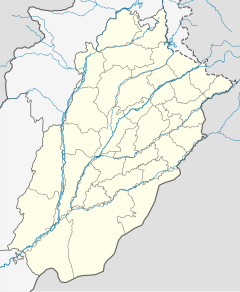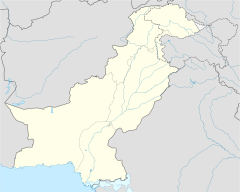 | |
Former name | See note[note 1] |
|---|---|
| Established | 31 July 1976[1] |
Field of research | National security Fundamental science |
| Location | Kahuta in Rawalpindi, Punjab, Pakistan 33°37′16″N 73°22′41″E / 33.621106°N 73.3781°E |
| Affiliations | |
Operating agency | National Command Authority |
| Website | krl.com.pk |
| Map | |
Location in Punjab, Pakistan | |
The Dr. A. Q. Khan Research Laboratories (shortened as KRL),[2] is a federally funded research and development laboratory located in Kahuta at a short distance from Rawalpindi in Punjab, Pakistan. Established in 1976, the laboratory is best known for its central role in Pakistan's nuclear weapons program and its understanding the nuclear science.[3]
Established in 1976, it was originally organized as a top-secret plant dedicated to enrichment as a response to the India's detonation of its first nuclear bomb in 1974.[3] Chosen for its remote yet relatively accessible location from Rawalpindi. [3][4][5] In the 1970s, the site was the cornerstone of the first stage of Pakistan's atomic bomb program, and serves as the center for conducting the nuclear scientific research.[6]
It is globally known for its research in gas centrifuges to produce the enriched uranium; and in past, it has competed with the PINSTECH on wide variety of weapon designs but it is now have focused in civilian missions, including the national security, fusion science and supercomputing.[6][7]
Cite error: There are <ref group=note> tags on this page, but the references will not show without a {{reflist|group=note}} template (see the help page).
- ^ Aziz, Shaikh (26 July 2015). "A leaf from history: Defending Kahuta". DAWN.COM.
- ^ Cite error: The named reference
originwas invoked but never defined (see the help page). - ^ a b c Moltz, Sarah J. Diehl, James Clay (2008). Nuclear weapons and nonproliferation : a reference handbook (2nd ed.). Santa Barbara, Calif.: ABC-CLIO. ISBN 978-1598840711.
{{cite book}}: CS1 maint: multiple names: authors list (link) - ^ "Kahuta Research Laboratories (KRL) | Facilities | NTI". www.nti.org.
- ^ Cite error: The named reference
News International, Part Xwas invoked but never defined (see the help page). - ^ a b Cite error: The named reference
Federation of American Scientistswas invoked but never defined (see the help page). - ^ "Sample Preparation Facilities". GC University Press. Archived from the original on 7 March 2020. Retrieved 20 October 2014.

